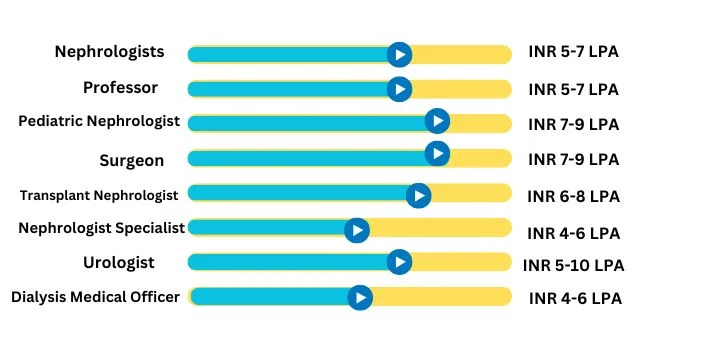Career in Nephrology in India: The field of medical science encompasses a wide array of specialties that focus on various human body systems and their related ailments. Among these, nephrology stands out as one of the most dynamic and engaging disciplines. The likelihood of experiencing kidney dysfunction is greater than that of liver dysfunction, largely due to the prevalence of chronic health conditions that often coexist. Kidney diseases can arise from various health issues, including diabetes, obesity, cardiovascular diseases, and hypertension. Furthermore, kidney ailments can contribute to the onset of hypertension and heart disease, even in individuals who previously did not have these conditions.
The increase in tobacco and substance use has significantly contributed to the rising number of patients facing kidney-related challenges. Nephrology, as a specialized branch of medicine, concentrates on the examination and treatment of kidney disorders, kidney transplantation, and hypertension management. This article provides a comprehensive overview of nephrology, emphasizing the diverse career opportunities available within this field.
Quick Facts
| Particulars | Description |
| Course Duration | 3 years |
| Examination Type | Semester |
| Eligibility | MBBS (Bachelor of Medicine and Bachelor of Surgery) |
| Admission Process | Entrance based selection |
| Average Fees | 10k-25L |
| Skills Required | Critical thinking skills, compassion, patience, Scientific Skills |
| Job Profile | Pediatric, Nephrologist, Surgeon, Dialysis |
| Recruiting Sectors | Research Centers, Dialysis Centers, Colleges |
What is Nephrology?
The term nephrology, derived from the Greek words “nephron,” meaning kidney, and “logy,” meaning study. Therefore, nephrology is a specialized area dedicated to the study of kidneys and related disorders. Initially, it was established as a medical discipline aimed at understanding normal kidney functions and addressing associated complications.
With advancements in technology, nephrology has evolved to include artificial organs and dialysis, which can replicate normal kidney functions. Professionals in this field are referred to as nephrologists, who are equipped to treat kidney-related diseases as well as other conditions such as end-stage renal disease that may result from inadequate dialysis treatment.
Who are Nephrology Specialists?
Nephrology specialists are medical professionals who focus on the study and treatment of kidney-related conditions. A nephrologist: a physician dedicated to nephrology, which encompasses both adult and pediatric aspects of kidney health and disease. These specialists are responsible for diagnosing and managing various kidney disorders, ensuring the maintenance of the body’s fluid and electrolyte equilibrium.
In addition to kidney diseases, nephrologists address related complications such as hypertension, fluid retention, and imbalances in electrolytes and minerals. They also oversee kidney dialysis procedures, including hemodialysis and peritoneal dialysis, as well as kidney transplant operations and subsequent patient care.
Nephrologists possess extensive knowledge in renal health and are committed to identifying kidney issues to promote overall well-being. The kidneys play a crucial role in filtering blood to eliminate waste and toxins while regulating the body’s water, acid-base balance, and mineral levels.

Courses in Nephrology
The following outlines the curriculum for nephrology studies:
| Course Name | Duration |
| Doctor of Medicine (MD) in Nephrology | 3 years |
| Diplomate of the National Board of Medical Exams (DNB) in Nephrology | 3 years |
Admission Process for the Nephrology Course
To gain admission to the MD in Nephrology program, candidates must meet the following requirements:
- Applicants must hold an MBBS degree with a minimum of 60% marks.
- Candidates are required to take the NEET PG examination for course admission.
Eligibility Criteria
The eligibility criteria for students aspiring to enroll in this program are as follows:
| Particulars | Description |
| Age limit | The minimum age limit is 35 years |
| Qualification | MBBS degree with MD General Medicine |
| Qualifying Entrance Exam | NEET PG, JIPMER, PGIMER, AIIMS |
Syllabus for the Nephrology Course
The semester-wise syllabus for the nephrology course is detailed below:
| Semester I | Semester II |
| Anatomy of Kidney | Basic and Advanced investigations in renal diseases |
| Embryology of the Kidey | Fluid and Electrolyte Disorders |
| Physiology of the Kidney | Basic Knowledge of Immunology |
| Semester III | Semester IV |
| Basic Knowledge of Renal Pathology | Kidney Diseases in Children |
| Basic Knowledge of Renal Therapeutics | Hereditary Congenital Kidney Diseases |
| Basic Training in Renal Radiology |
| Semester V | Semester VI |
| Kidney Diseases in Pregnancy | Interstitial Diseases |
| Glomerular Disease | Hypertension Vascular Diseases |
| Kidney Disorder in Geriatrics |
Top Institutions in India for Nephrology Programs
Numerous institutions in India provide specialized courses in Nephrology. Among the premier colleges for Nephrology in the country are the following:
| College Name | Location |
| All India Institute of Medical Sciences | New Delhi |
| Christian Medical College | Vellore |
| Andhra Medical College | Visakhapatnam |
| Dr NTR University of Health Sciences | Vijayawada |
| Government Medical College | Kozhikode |
| MS Ramaiah Medical College | Bangalore |
| Dr Dy Patil Medical College | Pune |
Conditions Associated with Nephrology
The branch of Nephrology encompasses a variety of medical conditions, including the following:
| Renal Vascular Diseases- related to blood vessels within the Kidney | Glomerulonephritis and glomerular disease |
| Acute and chronic kidney diseases | Kidney related metabolic disorders |
| Kidney and pancreas transplantation | Lupus |
| Diabetes | Fluid and electrolyte disorders |
| Hypertension | Acid base imbalances |
| Nephritic Syndrome and Nephritis | Tumors in the Kidney, Uterus and Bladder |
| Hydronephrosis | Kidney stone and Bladder Stone |
| Diabetes and Urine Abnormalities | Glomerular Disorders |
Career Prospects in Nephrology
The need for Nephrologists is notably significant, as the kidneys are susceptible to various medications and health issues, making them one of the most delicate organs in the human body. Nephrologists have the opportunity to practice in both private and public healthcare facilities, where referrals from other medical professionals are common.
Additionally, numerous kidney and dialysis centers present a range of employment options for Nephrologists. Those with substantial experience and expertise may pursue roles as Nephrology consultants or establish independent practices. Furthermore, educational institutions offering nephrology programs often seek qualified nephrologists for academic positions.
Responsibilities of a Nephrologist
The responsibilities of a nephrologist include:
• Consulting with patients during visits
• Performing physical examinations of patients
• Referring patients to urologists when necessary
• Recommending appropriate renal care
• Overseeing recovery following surgical procedures
• Engaging in research and academic studies
Skills Necessary for Nephrologists
The following skills are essential for specialists in nephrology:
• Critical thinking abilities
• Meticulous attention to detail
• Problem-solving skills
• Empathy
• Patience
• Scientific expertise

Job Description for Nephrology
The following outlines the job descriptions associated with the nephrology course:
| Pediatric Nephrologist | Nephrologist |
| Surgeon | Transplant Nephrologist |
| Dialysis Medical Officer | Professor |
| Consultants | Intervention Nephrologist |
| Nephrology Specialist | Urologist |

Average Salary
A nephrologist can anticipate an initial salary ranging from INR 2-4 LPA; however, compensation may vary between government and private sectors. With substantial experience in this field, nephrology specialists have the potential to earn a significant salary package. Below, the average salary associated with the nephrology course:
| Job Profile | Average Salary |
| Nephrologists | INR 5-7 LPA |
| Professor | INR 5-7 LPA |
| Pediatric Nephrologist | INR 7-9 LPA |
| Surgeon | INR 7-9 LPA |
| Transplant Nephrologist | INR 6-8 LPA |
| Nephrology Specialist | INR 4-6 LPA |
| Urologist | INR 5-10 LPA |
| Dialysis Medical Officer | INR 4-6 LPA |

Employment Sectors
The following sectors are known for hiring nephrologist specialists:
| Research Centres | Dialysis Centers |
| Rehabilitation Centers | Colleges |
| Kidney Centers | Medical Centers |
| Hospital | Organizations |
Leading Recruiting Firms
The following are prominent companies that employ nephrologist specialists:
| Apollo Hospitals | AIIMS |
| Medanta | Manipal Hospital |
| BLK Super Specialty Hospital | Fortis Hospital |
| Vijaya Hospital | SL Raheja Hospital |


Leave a Reply